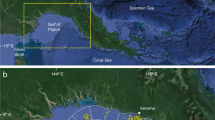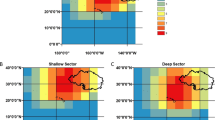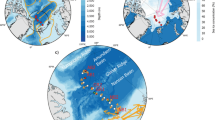Abstract
IN March 1958, a series of fish-marking experiments was initiated for the first time in Sierra Leone territorial waters. Only the demersal species of commercial importance were marked, and the area chosen for the first year's liberations was the trawling ground off Robene Point, some 13 miles from the mouth of the Sierra Leone River estuary. The fish for marking were caught with a 28 ft. or 42 ft. otter trawl towed by a 28 ft. diesel-powered launch. A total of 439 hauls, each of 39 min. duration, was made during the course of the marking experiments.
This is a preview of subscription content, access via your institution
Access options
Subscribe to this journal
Receive 51 print issues and online access
$199.00 per year
only $3.90 per issue
Buy this article
- Purchase on Springer Link
- Instant access to full article PDF
Prices may be subject to local taxes which are calculated during checkout
Similar content being viewed by others
References
Bainbridge, V., J. Ecol. (in the press).
Author information
Authors and Affiliations
Rights and permissions
About this article
Cite this article
WATTS, J. Seasonal and Tidal Fluctuations in the Trawl Catches from the Sierra Leone River Estuary. Nature 183, 1748–1749 (1959). https://doi.org/10.1038/1831748a0
Issue Date:
DOI: https://doi.org/10.1038/1831748a0
Comments
By submitting a comment you agree to abide by our Terms and Community Guidelines. If you find something abusive or that does not comply with our terms or guidelines please flag it as inappropriate.



